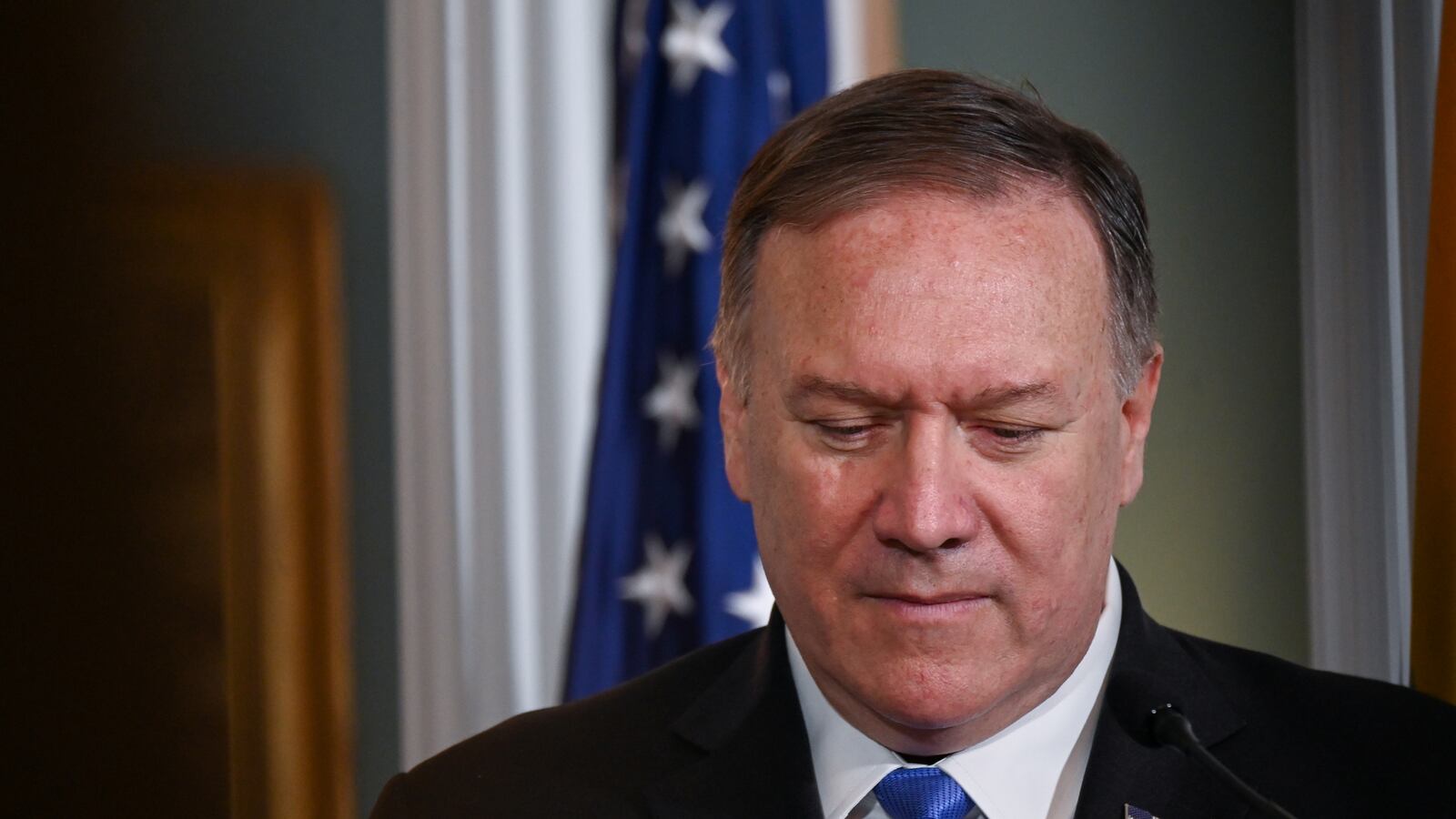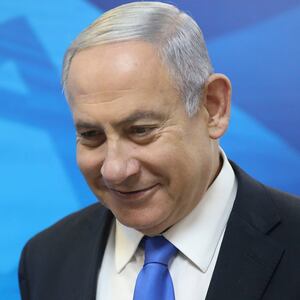JERUSALEM—After a long dry spell, President Donald Trump appeared to come to his old pal Benjamin Netanyahu’s aid on Monday, right at the nadir of Bibi’s long fight for his political life.
Netanyahu still clings to power after failing to win enough support to form a government in two national elections this year. His top rival, former army chief Benny Gantz, has 48 hours to try his luck forming a government. Netanyahu has attempted to thwart that by engaging in all-out political war against Israel’s Arab citizens, referring to the Arab-majority parties who may support a Gantz coalition as purveyors of terror who endanger the existence of the state.
Making matters worse, Netanyahu is expected to be indicted on corruption and bribery charges within days.
In the final stretch of each of the last elections, in April and in September, Netanyahu has made vague promises about formally annexing parts of the West Bank, land Palestinians claim for their own future state, but which Israel has occupied since 1967 when it was ruled by Jordan.
Netanyahu and Trump have not spoken for months. So any indication the president was back with Bibi— the nickname by which Netanyahu is ubiquitously referred to in Israel—would be welcomed.
And Netanyahu did exult in the moments after Secretary of State Mike Pompeo announced the United States had reversed a decades-old policy holding that Israel’s settlements in the West Bank are “inconsistent with international law.”
That view, which reflects the international consensus and the Geneva Convention barring an occupying power from transferring its own civilian population to occupied land, was formalized in 1978 by the Carter administration.
In a series of tweets, Netanyahu announced he had spoken with the president and thanked Trump for “repairing an historic injustice.”
“I told the president we are not in a foreign land but in our homeland of more than 3,000 years,” Netanyahu said he said. “This has been our homeland for over 3,000 years. The reason we are called Jews is because we are the people of Judea.” The occupied West Bank includes historic Judea and Samaria.
The White House has not confirmed the call took place and Trump, who has not been seen in public for three days, since his unannounced visit to Walter Reed Medical Center on Saturday, did not respond to Netanyahu’s tweeted gratitude.
In a statement, Palestinian Prime Minister Mohammed Shtayyeh said “the Trump administration’s bias toward Israel’s most extreme currents blinds it to the vision of the fundamental principles of international law, now in an attempt to support Netanyahu in the final moments of competition for the post of prime minister.”
But Hanan Ashrawi, a Christian Palestinian and stalwart of the peace process, noted Pompeo’s background as a messianic evangelical appealing to like-minded Trump voters. Ashrawi tweeted that the move was “another blow to international law, justice & peace by a biblical absolutist waiting for the ‘rapture.’”
Several reports have suggested in recent weeks that Pompeo is primed to run for the U.S. Senate in Kansas next year, although he has denied that’s the case.
Monday’s announcement reflected the latest abrupt Trump administration move to side with Israel against Palestinian claims. Palestinian officials have boycotted the U.S. since Trump announced recognition of Jerusalem’s capital in December 2017 and later recognized Israeli sovereignty over the Golan Heights, which was captured from Syria in 1967.
Each of the other policy reversals regarding Israel and the Palestinians was announced with pomp and ceremony by Trump, including the Golan declaration, which he made in Washington while a surprised Pompeo was holding meetings in Jerusalem.
Thus Pompeo’s Monday declaration, made at a rushed press conference, left more questions than answers.
“The Trump administration is reversing the Obama administration’s approach towards Israeli settlements,” he began, intentionally misstating the case, since Obama merely upheld decades of American policy.
Pompeo is facing growing pressure, and, according to NBC News, the anger of a mercurial president, as diplomats have testified to the House impeachment inquiry regarding both Trump’s and Pompeo’s actions in relation to Ukraine.
The secretary of state offered no legal arguments to explain why the United States now believes “the establishment of Israeli civilian settlements in the West Bank is not per se inconsistent with international law” and appeared to offer an immediate hedge against possible anger from the Arab world by adding that the U.S. was “not addressing or prejudging the ultimate status of the West Bank” and expressing “no view on the legal status of any individual settlement.”
If anything, Pompeo appeared once again to be isolating the United States from an international consensus while sowing confusion in the region about its real intentions.
In Israel, the statement is likely to have no impact. Pompeo’s announcement has no effect on international law and while both he and Netanyahu touted the ability of Israel’s legal system to handle any challenges to settlers’ rights, Israeli law and even Netanyahu’s attorney general have repeatedly defined the West Bank as occupied territory, despite de facto recognition of much of Israel’s settlement in the disputed area.
Amir Oren, a veteran political analyst writing for the WallaNews website, said flatly, “It is all for show.”
“The [Israeli] Supreme Court has not ruled out the settlements per se, so Americans are also allowed to say that they are not necessarily illegal. But declarations of American recognition of Israeli sovereignty in West Jerusalem and its annexation of the Golan did not promote peace in the region, as Trump’s America has no foreign policy—only re-election policy.”
In Israel, Pompeo’s statement appeared to have electoral purposes as well. After Netanyahu thanked Trump in English, he tweeted out his real feelings, in Hebrew. “Amazing,” he wrote. “At the same moment the United States recognizes our rights over Eretz Israel, Benny Gantz tries to establish a minority government with those who do not recognize any of our rights in our nation.”
Gantz’s Blue & White party riposted “We will not be schooled by a man who warmly shook Arafat’s hand and transfers tens of millions of dollars as a protection to Hamas every month. Bibi, let the people of Israel see Messi in peace.”
The reference was to soccer superstar Lionel Messi. On Monday night, most of Israel was transfixed by a long-awaited match in Tel Aviv between Uruguay and Argentina, with the main attraction being Messi—or “The Messi-ah,” as he was called by the Times of Israel.
The only real effect appeared to be on U.S. citizens. Immediately after Pompeo’s announcement, the U.S. embassy advised Americans to maintain a high level of vigilance and to take appropriate steps to increase their security awareness “in light of the current environment” in Jerusalem, the West Bank, and Gaza.
On Tuesday, Russia’s foreign ministry warned the Trump administration’s decision to shift its policy would only “escalate” tensions between Israel and the Palestinians.
Trump came into office touting his ability to weave together an “ultimate” peace deal between Israelis and Palestinians, appointing son-in-law and senior adviser Jared Kushner to the task. But the plan has failed to materialize, and despite Netanyahu’s claims that the move would advance peace “because you cannot build true peace on a foundation of lies,” it’s difficult to see who the dramatic shift would help.








